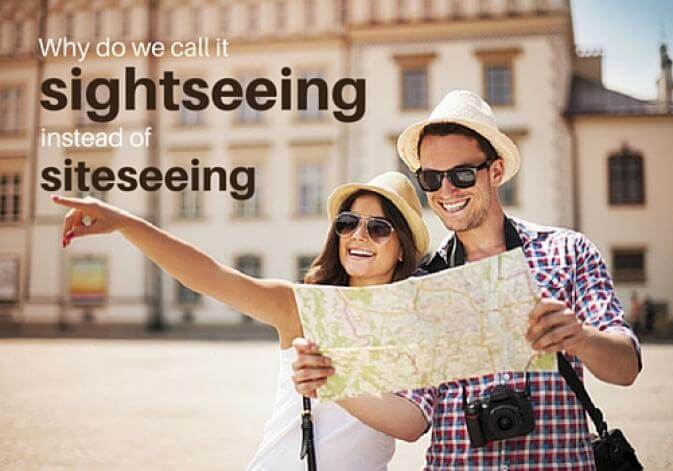Sightseeing Versus Siteseeing
Mignon Fogarty

A listener named Jack Rumple asked, “Why is it sightseeing and not siteseeing? Aren’t you seeing sites? Sightseeing sounds redundant.”
That’s such a good question! And since summer is peak sightseeing season, it’s time for an answer.
The two different spellings aren’t related etymologically—they have different origins. Site comes from words that mean “place,” and sight comes from words related to see.
Site
According to the Oxford English Dictionary, site was first used to describe a place where you find a specific thing around 1400. Chaucer was one of the first writers to use it with this line from A Treatise on the Astrolabe. He wrote, “Albeit so that from the equinoxial may the declinacion or the latitude of any body celestial be reckoned after the site north or south.”
An astrolabe is an ancient tool for telling time and figuring out your latitude based on the position of the sun or stars. Chaucer did more than write the Canterbury Tales, and A Treatise on the Astrolabe was an instruction manual for how to use this celestial tool. (Here’s a neat TED talk on YouTube explaining how to use one.)
Sights
About 200 years later in the 1600s, people started calling neat things you see on vacation sights. Even though this meaning of this spelling of sight didn’t emerge until the 1600s, the same word had other meanings much earlier, going back to at least the year 950. Back then it referred to something remarkable or a spectacle, but not a place or a thing at a place, rather something strange or supernatural. Still, you can see how the new meaning could emerge—from a remarkable vision people may hope to see (maybe something such as the northern lights) to any remarkable thing worth taking a trip to see.
Although sight is related to the word see, you can see how with this other meaning, it’s not redundant to talk about sightseeing. It means going to see something remarkable.
Sightseeing
It was another 200 years after sight took on this meaning, in the 1800s, when people started using the word sightseeing. Reginald Heber, the Bishop of Calcutta, wrote about “morning rides” and “evening sight-seeing.”
Thanks for the question, Jack. I wish you much happy sightseeing this summer.
References
astrolabe. Oxford English Dictionary. https://0-www.oed.com.innopac.library.unr.edu/view/Entry/12253?redirectedFrom=astrolabe#eid (accessed June 28, 2016, subscription required).
sight. Oxford English Dictionary. https://0-www.oed.com.innopac.library.unr.edu/view/Entry/179459?rskey=Cb1AJO&result=1&isAdvanced=false#eid (accessed June 28, 2016, subscription required).
sightseeing. Oxford English Dictionary. https://0-www.oed.com.innopac.library.unr.edu/view/Entry/179480?redirectedFrom=sightseeing#eid (accessed June 28, 2016, subscription required).
site. Oxford English Dictionary. https://www.etymonline.com/index.php?term=sights&allowed_in_frame=0. (accessed June 28, 2016, subscription required).
Image courtesy of Shutterstock.

